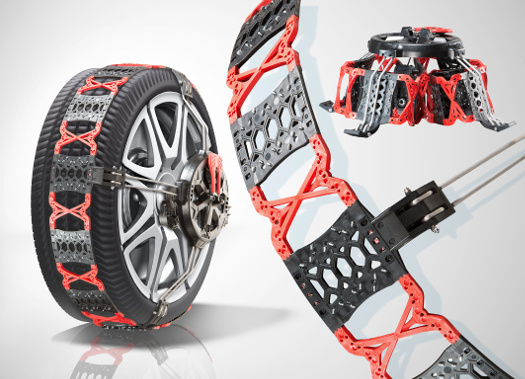 |
| February 23, 2016 | Volume 12 Issue 08 |
Designfax weekly eMagazine
Archives
Partners
Manufacturing Center
Product Spotlight
Modern Applications News
Metalworking Ideas For
Today's Job Shops
Tooling and Production
Strategies for large
metalworking plants
Wheels:
Plastic tire chains try to get a grip in Europe
Even at low temperatures, plastic can be an efficient substitute for metal.
A French textile and rubber company called Joubert Productions has put snow chains on the market in Europe that have chain links made entirely of plastic. The chains use Elastollan, the thermoplastic polyurethane (TPU) from BASF.

Although there are already a slew of different plastic chain-type sets on the market in the United States and abroad, what differentiates this technology is the materials incorporated and the molding technique used to put the chains together.
Along with BASF's support in optimizing the component geometry and production, designers at Joubert Productions came up with a snow-chain design that has each unit made from two Elastollan grades: B90A15 and B60A10WH.
The materials meet the ONORM 5117 standard (which applies across Europe), are suitable for different tire sizes, and are easy to fit. The Elastollan versions are abrasion resistant, flexible at low temperatures, and resistant to loose chips and road salt. Better yet, they provide an optimum grip on ice and snow.
For this new plastic application, Elastollan offered an excellent combination of lightweight construction and serial production. The conventional metal chain mesh is replaced by two Elastollan grades of different colors that chemically adhere to one another in the injection-molding process, so they do not have to undergo additional assembly.
The black Elastollan B90A15, which has a harder setting, displays very good mechanical properties along with great flexibility at low temperatures. The red Elastollan B60A10WH is more flexible and easy flowing.
In compact injection molding, the black chain links are overmolded with the red Elastollan in one mold and are joined chemically. Because TPU adheres to TPU very well, there is no need for another assembly step. Metal chains of this type require several assembly steps.
The Austrian standard ONORM 5117 is designed for metallic chain links that cover the full tread of tires and must be in contact with the road surface no matter which position the wheel is in. Due to the outstanding road grip of BASF's TPU, the new plastic snow chains enable car drivers to enjoy the best possible control over their vehicles on snow-covered roads. Since the Elastollan links are much lighter than the conventional metal mesh, the snow chains are easy to handle and quick to remove.
Source: BASF Performance Materials
Published February 2016
Rate this article
View our terms of use and privacy policy
